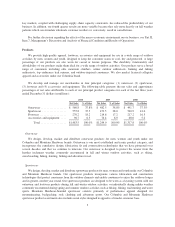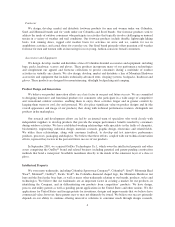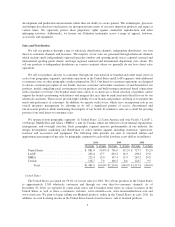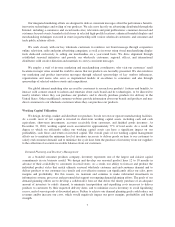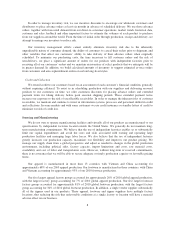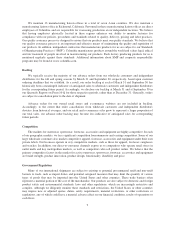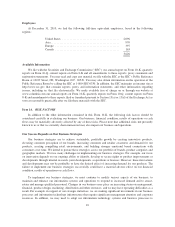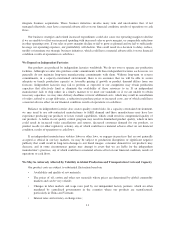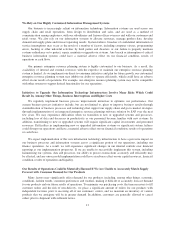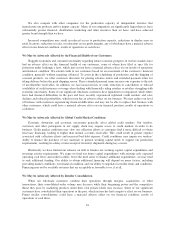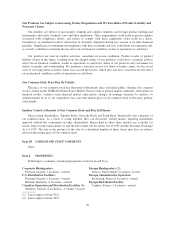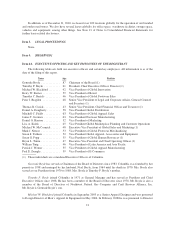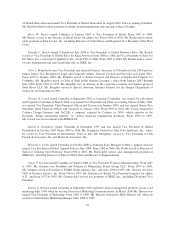Columbia Sportswear 2010 Annual Report Download - page 19
Download and view the complete annual report
Please find page 19 of the 2010 Columbia Sportswear annual report below. You can navigate through the pages in the report by either clicking on the pages listed below, or by using the keyword search tool below to find specific information within the annual report.We Rely on Our Highly Customized Information Management Systems
Our business is increasingly reliant on information technology. Information systems are used across our
supply chain and retail operations, from design to distribution and sales, and are used as a method of
communication among employees, with our subsidiaries and liaison offices overseas and with our customers and
retail stores. We also rely on our information systems to allocate resources, manage product data, develop
demand and supply plans and forecast operating results. System failures, breaches of confidential information or
service interruptions may occur as the result of a number of factors, including computer viruses, programming
errors, hacking or other unlawful activities by third parties and disasters, or our failure to properly maintain
systems redundancy or to protect, repair, maintain or upgrade our systems. Any breach or interruption of critical
business information systems could have a material adverse effect on our financial condition, results of
operations or cash flows.
Our primary enterprise resource planning system is highly customized to our business. As a result, the
availability of internal and external resources with the expertise to maintain our enterprise resource planning
system is limited. As we implement our direct-to-consumer initiatives and plan for future growth, our customized
enterprise resource planning system may inhibit our ability to operate efficiently, which could have an adverse
effect on our results of operations. For example, our enterprise resource planning system may not be compatible
with other systems to support desired functionality for our operations.
Initiatives to Upgrade Our Information Technology Infrastructure Involve Many Risks Which Could
Result In, Among Other Things, Business Interruptions and Higher Costs
We regularly implement business process improvement initiatives to optimize our performance. Our
current business process initiatives include, but are not limited to, plans to improve business results through
standardization of business processes and technology that support our supply chain and go-to-market strategies
through implementation of an integrated enterprise resource planning software solution by SAP over the next
few years. We may experience difficulties when we transition to new or upgraded systems and processes,
including loss of data and decreases in productivity as our personnel become familiar with new systems. In
addition, transitioning to new or upgraded systems will require significant capital investments and personnel
resources. Difficulties in implementing new or upgraded information systems or significant system failures
could disrupt our operations and have a material adverse effect on our financial condition, results of operations
or cash flows.
We expect implementation of this new information technology infrastructure to have a pervasive impact on
our business processes and information systems across a significant portion of our operations, including our
finance operations. As a result, we will experience significant changes in our internal controls over financial
reporting as our implementation progresses. If we are unable to successfully implement this system, including
harmonizing our systems, data and processes, our ability to process transactions accurately and efficiently may
be affected, and any unsuccessful implementation could have an adverse effect on our capital resources, financial
condition, results of operations and liquidity.
Our Results of Operations Could be Materially Harmed If We Are Unable to Accurately Match Supply
Forecast with Consumer Demand for Our Products
Many factors may significantly affect demand for our products, including, among other things, economic
conditions, fashion trends, consumer preferences and weather, making it difficult to accurately forecast demand
for our products and our future results of operations. To minimize our purchasing costs, the time necessary to fill
customer orders and the risk of non-delivery, we place a significant amount of orders for our products with
independent factories prior to receiving all of our customers’ orders, and we maintain an inventory of various
products that we anticipate will be in greater demand. In addition, customers are generally allowed to cancel
orders prior to shipment with sufficient notice.
13


